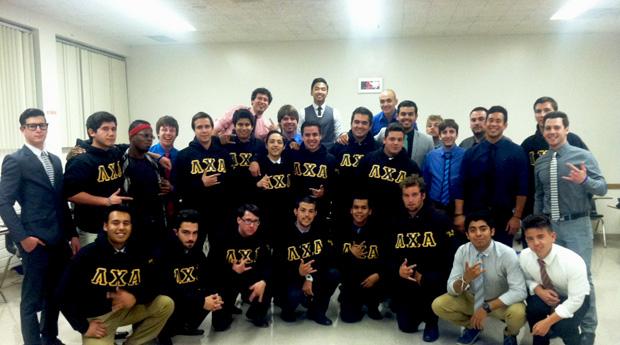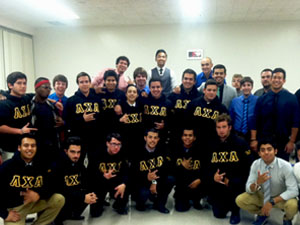
We’re all familiar with the image of the meathead, drunken frat boy and the ditzy, promiscuous sorority girl. From “Van Wilder” to “The House Bunny,” stereotypes of Greek life abound in the media.
The CSUN Greek community, consisting of 26 fraternities and 26 sororities, is anything but the stereotype. While there may be a party here or there, Greek Matadors focus on forming positive experiences for their brothers and sisters that ultimately improve the CSUN community.
Fraternity life
Hugo Valencia, 23, a senior CTVA major and the public relations officer of Phi Delta Theta said before entering Greek life, even he was affected by the stereotypes he saw of fraternity members.
“In movies, you see a lot of party guys who treat women like objects who are pretty much drunk all the time and sloppy,” Valencia said. “I always told myself that I would never join a fraternity, ever.”
Once he did, Valencia experienced benefits he didn’t see coming, in particular the bond that is formed with the other members of his fraternity.
“The brotherhood (consists of) the type of guys that are there for you,” Valencia said. “It’s a different kind of bond. You can’t really explain it. It’s more of an experience.”
Valencia said he knows he can always count on other members of Phi Delta Theta whenever he is in a pinch.
“One time I was stranded in Glendale at midnight, and (some of my brothers) went and picked me up,” Valencia said. “It’s good to know that you have people you can really rely on for help.”
Luis Canton, 21, political science major and the vice president of Lambda Chi Alpha said Greek members work to not only be there for each other but for the CSUN community in general.
“A lot of (Greeks) are involved in other organizations,” Canton said. “For example, 15 of our members are involved in New Student Orientation.”
Valencia mentioned that Greek members aren’t as academically challenged as stereotypes would make it appear. He said a minimum 2.5 GPA is required for members of the Greek system.
Canton said achieving in academics helps break negative stereotypes of the Greek system.
“We put a higher standard on ourselves,” he said. “We know the stereotype, so we try to get the best grades. People in fraternities and sororities join together to form study groups.”
Canton said good grades and community involvement are values shared by fraternities and sororities campus-wide.
“It’s not all about the parties,” Canton said. “Here at CSUN, we do believe we are here for the same cause, and that’s to become better individuals.”
Sorority life
Like fraternity members, partying hard is not the norm for Felicia Rogozenski, 21, senior business marketing major and president of the Alpha Omicron Pi sorority.
“(My typical day) is basically a bunch of emailing,” she said. “I’m delegating to officers and contacting them to make sure they’re doing their jobs.”
These jobs include planning sorority-wide meetings, organizing intramural sports, getting ready for recruitment, holding events to raise money for charity, and putting on socials.
“A leadership position is (the workload of) an extra class or two,” Rogozenski said.
The skills in project management alone have made Rogozenski’s four years as a part of Alpha Omicron Pi worthwhile.
“It’s really prepared me for my future because it teaches you to time manage more, to get back to people in time,” Rogozenski said. “It makes you more responsible as a person.”
The stereotype of the drunken party girl is an unfair label on Greek members, Rogozenski said.
“If you’re going to want to party in college, you’re going to find a way no matter if you join the Greek system or not,” she said.
Shannon Moultrie, 20, junior liberal studies major and new member educator of Delta Zeta, said her position is all about steering new members away from the stereotype.
“I educate them about the history of the sorority, get them involved in the chapter, and get on them about academics to let them know we’re not here to party,” Moultrie said.
Getting the new members so involved with the sorority allows for a sisterhood to form, which in Moultrie’s opinion, is the best part of being in a sorority.
“(It’s important) knowing there’s always someone there to call and they’ll understand what I’m going through, or just be there,” she said.
Rogozenski agreed.
“If there’s anything family-related, or anything that you’re going through that you need to talk to somebody about, there’s always girls there to help you with that,” she said.
Rogozenski said Greek involvement does involve a financial commitment, but that a portion of this money goes back to the girls.
“(The money) goes toward you, which a lot of people don’t understand,” she said. “Things like toilet paper and paper towels. It also goes to socials so you don’t have to pay (extra) for that, and it goes to your philanthropy event. It goes to jerseys for intramurals.”
At Alpha Omicron Pi, the cost is around $550 a semester, Rogozenski said, but the cost varies depending on which house you join.
While there may be minimum requirements to join Greek life, like the 2.5 GPA and financial obligations, Rogozenski said ultimately the Greek community is very inclusive at CSUN.
“Anyone can join,” she said. “Our Greek system is really diverse. It’s for everyone.”
Moultrie encouraged CSUN students to look past the stereotype and think about joining a sorority.
“You gain so much in leadership skills, academics, and friendships that last a lifetime,” she said. “It’s not about partying and backstabbing. It’s about how to become a better woman.”
